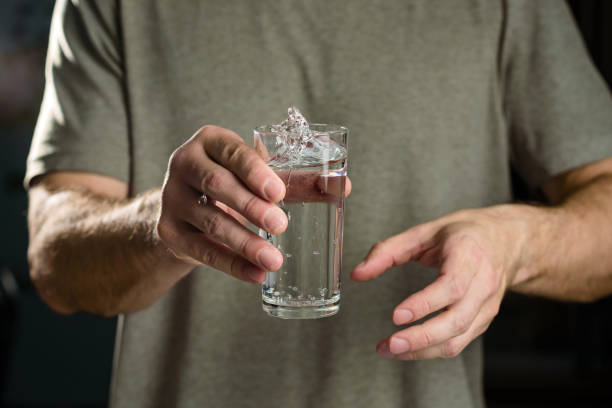For decades, those stationed at Camp Lejeune had no idea the water flowing from their taps was poisoning them. The tap water they and their families drank, cooked with, and bathed in was laced with cancer-causing chemicals like trichloroethylene (TCE) and benzene from an off-base dry cleaning shop and leaky fuel storage tanks.
While the dangers of the toxic water contamination at Camp Lejeune remained concealed for over 30 years, its impacts are just now coming to light.
Studies have uncovered a disturbing link between exposure to the water and a devastating neurological disease, Parkinson’s disease. As more victims come forward with Parkinson’s diagnoses, questions about the full scope of the contamination’s effects grow.

What Health Risks Were Posed by the Toxic Water at Camp Lejeune?
For several decades, those stationed at Camp Lejeune were exposed to contaminated drinking water. From the 1950s through the 1980s, industrial solvents like trichloroethylene (TCE) and perchloroethylene (PCE) seeped into the water supply from dry cleaning waste. Leaking underground fuel storage tanks also introduced benzene.
These toxic chemicals pose serious health risks. The Department of Veterans Affairs acknowledges that veterans exposed to tainted water may develop certain diseases years later. If diagnosed with one of eight specified conditions, a veteran is presumed to have developed it due to Camp Lejeune contamination.
Adult leukemia, aplastic anemia/myelodysplastic syndromes, bladder cancer, kidney cancer, liver cancer, multiple myeloma, non-Hodgkin’s lymphoma, and Parkinson’s disease are the eight presumed diseases. At this time, strong scientific evidence only supports causal links to these illnesses. However, the VA continues reviewing new information to add other presumptive diseases over time potentially.
While stationed at Camp Lejeune decades ago, many were unwittingly exposed through routine activities like showering or drinking tap water. Now, VA provides long-awaited recognition that this toxic exposure harmed veterans’ health in serious ways.
The Connection Between Parkinson’s Disease and Water Contamination
In a recent study, researchers analyzed the medical records of over 84,000 Marines who were stationed at Camp Lejeune in the 1980s. During this time, the base’s drinking water was contaminated with various toxic chemicals such as TCE, PCE, and VOCs. The contamination was caused by leaking subterranean storage tanks and other industrial sources at the base. In fact, TCE levels were over 70 times the safe limit according to EPA standards.
The researchers compared these records to those of over 73,000 Marines stationed at Camp Pendleton, which did not have contaminated water supplies. They found 279 Camp Lejeune veterans were diagnosed with Parkinson’s disease versus 151 from Camp Pendleton, representing a prevalence of 0.33% and 0.21%, respectively. Moreover, Camp Lejeune veterans exhibited higher rates of other conditions like anxiety, tremors, and erectile dysfunction – all potential early signs of Parkinson’s.
The study hypothesizes TCE exposure could be contributing to the global doubling of Parkinson’s cases since 1990.
Overall, the results showed Marines exposed to contaminated water at Camp Lejeune had a 70% higher risk of developing Parkinson’s later in life compared to those stationed at the uncontaminated Camp Pendleton base. This research helps strengthen the potential link between chronic TCE exposure and neurodegenerative conditions like Parkinson’s disease.
Camp Lejuene Victims Are Now Seeking Justice
Victims of contaminated water at Camp Lejeune have pursued justice and compensation for resulting health issues. According to TorHoerman Law, the Camp Lejeune Justice Act was passed recently, marking a significant advancement. This act enables individuals exposed to toxic water between 1953 and 1987 to seek damages in federal court.
Those present for 30 days, whether continuous or not, can pursue legal action, such as the Camp Lejeune lawsuit against the U.S. government. Unlike previous bills focusing solely on healthcare or disability benefits, this act provides a pathway to compensation through litigation.
It overrides a restrictive North Carolina law blocking similar claims and prohibits sovereign immunity as a defense. Studies found over one million people are potentially exposed to tainted water containing chemicals like TCE and PCE, causing serious illnesses.
Previous lawsuits were dismissed due to statutes of repose, but public frustration led to the Act’s proposal years later. This new law empowers qualifying service members, families, workers, and others harmed by Camp Lejeune’s toxic water between 1953 and 1987 to seek justice and fair recovery through the U.S. court system, a monumental development for all impacted by this environmental disaster.
In conclusion, the tragic saga of contaminated water at Camp Lejeune underscores the profound and lasting impacts of environmental negligence on human health. The revelation of a potential link between exposure to toxic chemicals and the development of Parkinson’s disease among veterans stationed at the base has raised significant concerns.
As victims seek justice and compensation through legal avenues like the Camp Lejeune Justice Act, it is evident that the effects of this environmental disaster continue to reverberate through the lives of those affected. Moving forward, it is imperative to prioritize accountability, support, and comprehensive solutions to prevent similar tragedies in the future.


